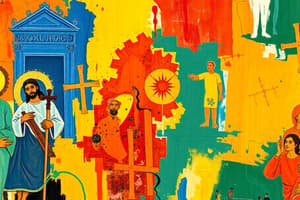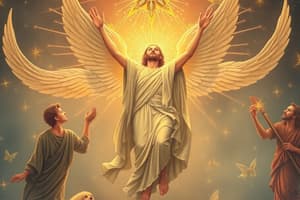Podcast
Questions and Answers
What distinguishes the Gospel of John from the Synoptic Gospels?
What distinguishes the Gospel of John from the Synoptic Gospels?
- It includes the nativity of Jesus.
- It presents a theological discourse on the Logos. (correct)
- It focuses on the earthly lineage of Jesus.
- It recounts the Passion and Resurrection events.
Which statement best describes Luke's account of the Annunciation?
Which statement best describes Luke's account of the Annunciation?
- It highlights the connection between John the Baptist and Jesus' birth. (correct)
- It emphasizes an angel's appearance to Joseph.
- The focus is solely on the birth of Jesus.
- Mary's response is similar to Zechariah's response.
What does the concept of Kenosis refer to in the context of the Passion?
What does the concept of Kenosis refer to in the context of the Passion?
- The punishment of Jesus for human sin.
- The ancient interpretations of divine wrath.
- Jesus' self-offering for his people. (correct)
- The divine power to raise life.
Which description defines the Holy Spirit's role in Pneumatology?
Which description defines the Holy Spirit's role in Pneumatology?
Which of the following correctly represents Tertullian's argument for Creation ex nihilo?
Which of the following correctly represents Tertullian's argument for Creation ex nihilo?
What does the term 'communication of idioms' refer to in Christology?
What does the term 'communication of idioms' refer to in Christology?
Which statement best describes Jesus' nature in Christian theology?
Which statement best describes Jesus' nature in Christian theology?
How do resurrection narratives provide historical testimony?
How do resurrection narratives provide historical testimony?
What is the essence of the Christus Victor model of salvation?
What is the essence of the Christus Victor model of salvation?
Which of the following best describes the concept of 'kenosis' as revealed by Christ?
Which of the following best describes the concept of 'kenosis' as revealed by Christ?
What does it mean for the Church to be 'Apostolic'?
What does it mean for the Church to be 'Apostolic'?
What is a key difference between John’s Baptism and Christian Baptism?
What is a key difference between John’s Baptism and Christian Baptism?
What effect does Baptism have on the individual, according to the teachings of the Church?
What effect does Baptism have on the individual, according to the teachings of the Church?
Which of the following best describes millennialism?
Which of the following best describes millennialism?
Which heresy denies the full divinity of Christ?
Which heresy denies the full divinity of Christ?
What does the Nicene Creed primarily affirm about Christ?
What does the Nicene Creed primarily affirm about Christ?
What is the Church's stance towards modern science?
What is the Church's stance towards modern science?
Which of the following is a characteristic of the Church being 'Holy'?
Which of the following is a characteristic of the Church being 'Holy'?
Flashcards
Models of Salvation
Models of Salvation
Different ways Christians understand how God saves people, including subjective, substitutionary, and Christus Victor.
Kenosis
Kenosis
Jesus' self-emptying; Christ's revealed truth about sacrifice on the cross.
Marks of the Church
Marks of the Church
Four essential characteristics of the Christian Church: One, Holy, Catholic, and Apostolic.
Infant Baptism
Infant Baptism
Signup and view all the flashcards
Effects of Baptism
Effects of Baptism
Signup and view all the flashcards
Resurrection of the Body
Resurrection of the Body
Signup and view all the flashcards
Millennialism
Millennialism
Signup and view all the flashcards
Arianism
Arianism
Signup and view all the flashcards
Nicene Creed
Nicene Creed
Signup and view all the flashcards
Christianity & Greek Philosophy
Christianity & Greek Philosophy
Signup and view all the flashcards
Synoptic Gospels
Synoptic Gospels
Signup and view all the flashcards
Jesus's Passion and Resurrection
Jesus's Passion and Resurrection
Signup and view all the flashcards
Christology
Christology
Signup and view all the flashcards
Creation ex nihilo
Creation ex nihilo
Signup and view all the flashcards
Logos
Logos
Signup and view all the flashcards
Holy Spirit (Pneumatology)
Holy Spirit (Pneumatology)
Signup and view all the flashcards
Gospel of John
Gospel of John
Signup and view all the flashcards
Study Notes
Gospels
- Four canonical Gospels exist: Matthew, Mark, Luke, and John. Each Gospel was written by different authors, reflecting their unique perspectives, and collectively they form the cornerstone of the New Testament, providing a foundational understanding of Jesus Christ's life and teachings.
- Synoptic Gospels (Matthew, Mark, Luke) present Jesus' life, lineage, and earthly ministry, beginning with the nativity. These Gospels share similar stories and outline the major events in Jesus’ life, including His birth, baptism, ministry, miracles, crucifixion, and resurrection, allowing for a comparative analysis of their accounts.
- John's Gospel offers a theological perspective, introducing the Logos concept, positioning Jesus as God incarnate. This unique portrayal emphasizes the divine nature of Jesus and His eternal existence prior to His manifestation on Earth, contributing to deeper theological discussions regarding the intersection of humanity and divinity.
- Other Gospels, like those of Thomas and Mary Magdalene, are not accepted by the Church. These texts, often labeled as "apocryphal," were left out of the canon due to concerns about their authenticity and alignment with orthodox Christian beliefs, which has led to an ongoing debate about their historical and spiritual value.
- Luke's account details the Annunciation, Visitation, and connection between John the Baptist and Jesus' births. This Gospel focuses on the role of women and the marginalized, revealing the depth of God's plan for salvation as it unfolds through these pivotal events.
- The Passion, Cross, and Resurrection are crucial, showcasing God's self-sacrifice (kenosis) instead of punishment. This concept of kenosis reflects the divine decision to engage with humanity profoundly, prioritizing love and redemption over retribution, hence making Jesus' ultimate sacrifice a central theme of Christian faith.
- Jesus' actions contrast power over life with the power to give life. Throughout His ministry, He performed miracles that brought healing and life, emphasizing His authority not just as a religious leader, but as the giver of eternal life and the source of hope.
- Resurrection narratives support historicity, portraying Jesus confronting betrayers with peace. The accounts offer profound insights into the nature of forgiveness and reconciliation, emphasizing the transformative power of the resurrection, which stands as a testament to the faith of the early Church and serves as a cornerstone for Christian belief.
Christology
- Jesus possesses a divine person with two natures: human and divine. This doctrine, known as the Hypostatic Union, is central to Christological studies and shapes the understanding of how Jesus can fully represent both God and humanity.
- Jesus exemplifies true humanity, emphasizing the intended relationship with God and others. His experiences, teachings, and interactions demonstrate the foundational principles of love, compassion, and justice that are essential to the Christian faith.
- Jesus is the divine Logos, pre-existing creation. In this capacity, He serves as the agent of creation and the intelligence of God, underscoring the belief that all things were created through Him and reflect His glory.
- Arguments for Jesus' pre-existence, like those in "Ancient Christian Doctrine," support this premise. These discussions often cite scriptural references that echo the sentiment that Jesus was present at and active during the creation of the world, further solidifying His role within the Godhead.
- Jesus is begotten, consubstantial with the Father, and the second person of the Trinity. This concept encapsulates the equality of Jesus with God the Father, thereby affirming His divinity in the construct of the Holy Trinity.
- Classroom and homework material cover the communication of idioms. This reflects the doctrine of how Jesus spoke and lived truthfully within cultural contexts, significantly shaping His messages and their reception.
- The Passion of Christ, as depicted in scripture, and the Sermon on the Mount/Beatitudes from Matthew's Gospel are vital. These elements are considered essential teachings, with the Passion illustrating the extent of God's love and the Beatitudes encapsulating the values of God's Kingdom.
Pneumatology
- The Holy Spirit is the third person of the Trinity, consubstantial with the Father and Son. The indwelling presence of the Holy Spirit is understood as a guide for believers, empowering them for service, and solidifying their relationship with God.
- The Holy Spirit performs God's works: creation, redemption, sanctification. Throughout scripture, the Spirit plays an integral role in the act of creation, the guidance of God's people, and the ongoing process of making believers holy, transforming them into the likeness of Christ.
Creation
- Tertullian argues for creation ex nihilo (from nothing), crucial for a comprehensive understanding of God. This theological assertion supports the notion that God is the ultimate source of all existence, transcending the created order and demonstrating His sovereignty and power.
Soteriology
- Three models of salvation exist (Subjective, Substitution, Christus Victor). These models offer different perspectives on how salvation is understood and experienced; Subjective focuses on personal experience, Substitution emphasizes the atoning sacrifice of Christ, while Christus Victor highlights the victory of Christ over sin and death.
- Christ's sacrifice (kenosis) corrects mistaken notions of sacrifice, revealing the true nature of God. By examining the depth of His sacrifice, believers gain insight into the character of God, who desires a relationship based on love and grace, rather than fear or obligation.
- Christ's revelation allows for a proper relationship between God and humanity. Through Jesus, humanity is presented with the opportunity for reconciliation, healing, and restoration in their relationship with their Creator, which was broken by sin.
Four Marks of the Church
- One: The Church is a unified body, rooted in one God, Spirit, baptism, faith. This oneness signifies the Church's collective mission and calls for unity among its members, regardless of their individual backgrounds or differences.
- Holy: Set apart by divine foundation, with a specific mission (discipleship and salvation). The Church is seen as a sacred institution established to carry out God’s purpose on Earth, embodying the holiness of God through the lives of its followers.
- Catholic: Universal, encompassing Christ's presence across time and place, for all people. This universality emphasizes the inclusivity of the Christian message, extending to every nation, culture, and generation.
- Apostolic: Established on the teachings of the Apostles, continuing their mission. The Church is built upon the foundation laid by the apostles and is called to carry forward the message of Christ as communicated by them, remaining faithful to this original teaching.
Baptism
- John's baptism differs from Christian baptism. While John’s baptism served as a sign of repentance, Christian baptism signifies the initiation into the Christian faith and a public declaration of faith in Jesus Christ.
- Infant baptism is a theological point of contention, with the Catholic Church justifying its practice. This practice is supported by a belief in original sin and the need for grace at an early age, ensuring the incorporation of all believers into the life of the Church.
- Baptism's effects include sin forgiveness, new creation, sanctifying grace, incorporation into Christ's body, priestly participation, and an indelible soul mark. These elements collectively relate to the transformation wrought by God's grace upon the individual, pointing toward the importance of baptism within the broader context of salvation.
Eschatology
- The resurrection of the body and diverse early Church views are to be considered. Various interpretations of the nature and timing of resurrection reflect different theological stances within the early Church and their implications for faith and practice.
- Millennialism and its varied interpretations within Christianity and the early Church are crucial. This eschatological concept explores different beliefs regarding the thousand-year reign of Christ and the implications for the Church's mission and eschatological hope.
Heresies
- Key heresies include Arianism, Dynamic Monarchianism (Adoptionism), Marcionism, Modalistic Monarchianism (Modalism), Nestorianism, and Gnosticism. Understanding these heresies is essential for grasping the development of orthodox beliefs and the historical context of early Christian debates about the nature of Christ and salvation.
Creeds
- The Nicene Creed addresses the Trinity and Christ's personhood, countering heresies like Arianism. This foundational statement articulates core Christian beliefs, serving to unify the Church and provide robust doctrinal clarity amidst various theological disputes.
Faith, Reason and Science
- The relationship between Christianity and Greek philosophy, the Church's stance on modern science, and how an ordered world contributes to modern science are to be explored. This exploration seeks to harmonize the insights of faith with the discoveries of reason, showcasing the compatibility and mutual enrichment of both realms in understanding the divine and the universe.
Studying That Suits You
Use AI to generate personalized quizzes and flashcards to suit your learning preferences.





